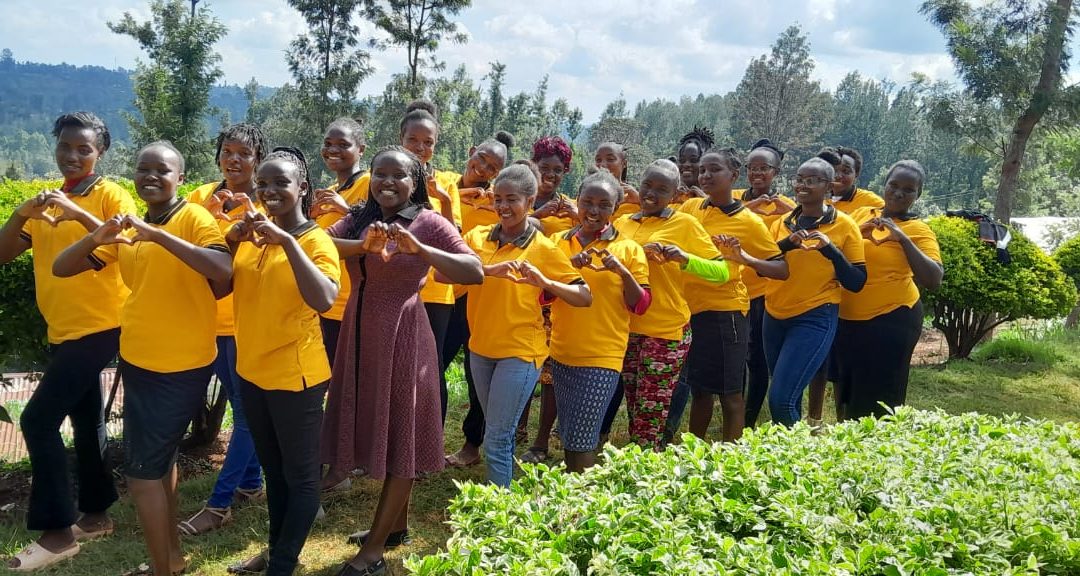International Women’s Day (March 8) is a global day celebrating the achievements of women. It also marks a call to action for accelerating women’s equality and well-being in all aspects of life – which is crucial to creating prosperous economies and a healthy planet.
Raising Futures Kenya’s Seed of Hope programme is contributing to closing gender gaps in vocational education in Kenya through targeted actions in support of young women and girls. By ensuring quality education for all, and equipping all our students with skills for employment, self-employment, or further education, we are enabling opportunities for a brighter future.
In recent decades Kenya has achieved gender parity at primary school level – which is to be celebrated. But gender gaps appear when it comes to girls completing secondary school and enrolling in tertiary education. Though perhaps more importantly, gender equality, where it has been achieved, has not yet translated into equality in life opportunities for women.
So where and how are some of these gender gaps arising?
- Gender-based violence – Data shows gender-based violence (GBV) in Kenya remains high with 35% of women and girls affected and 16% reported being victims of sexual violence before the age of 18. There are profound health and psychological costs and economic costs for survivors and their children. The economic cost of GBV is calculated to be about 1.1% of Kenya’s Gross Domestic Product (GDP).
- Adolescent pregnancy – Higher rates of pregnancy have been associated with poverty and lack of education. In the lowest wealth quartile in Kenya, 21% of women aged 15-19 have been pregnant. At secondary school, among the most common reasons for girls to miss school days were pregnancy and parenting responsibilities, putting them at a disadvantage in their education compared to their male counterparts.
- Period poverty – 65% of women and girls are unable to afford sanitary pads, presenting a huge barrier to work and education. Girls from poor families miss up to 20% of school days each year. Desperate need, has led to a practice of transactional sex for pads. Some research states that in rural areas of Kenya 2 out of 3 sanitary pad users are provided pads by sexual partners.
- Unpaid labour and the “baby profit gap” – the global value of unpaid care and domestic work for women aged 15 and over stands at around $10.8 trillion annually. In income-generating work, women and female-owned businesses, working whilst also caring for children can experience distractions and constant interruptions causing lower productivity, coined as the ‘baby profit gap’.
These prevailing gender gaps are underscored by mutually reinforcing challenges of poverty, barriers to education and economic opportunities, and restrictive social norms, which prevent self-reliance and perpetuate women and girls being at risk of exploitation and at economic disadvantage. This impedes the progress of individuals and communities. Raising Futures Kenya believe in the talent and resilience of young women and girls and our Seed of Hope programme is changing the narrative by empowering majority young female entrepreneurs!

Our Seed of Hope programme is responsive, tailored and inclusive to the needs of young women and girls, as well as boys in marginalised communities. Alongside courses to equip young people with skills, Seed of Hope provides essential practical support to female students such as packs of period pads and childcare vouchers, to remove barriers to attendance and enable them to thrive in their learning.
A key part of the programme for all students is Amuka – the Seed of Hope Life skills programme – which addresses community-wide issues negatively impacting students, particularly girls, such as gender-based violence, FGM, young marriage, and sexual reproductive health. It empowers girls to know their rights, encourages boys to become allies for girls. It includes group counselling and encourages students to work together to seek solutions to local/cultural challenges.


The Seed of Hope programme also provides unlimited free counselling sessions open to all students to work through the trauma, abuse and exploitation they have experienced. This enables young people to process trauma, develop coping mechanisms, and speak out to report abuse.
A general low preference to pursue certain school subjects for boys and for girls impacts on career pathways and trajectories, such as STEM; an issue that disproportionately affects girls. At Seed of Hope, we are proud to welcome and encourage trailblazing young women ambitious for careers in business and technology, and traditionally male-dominated vocational fields such as carpentry, electrical wiring, and motor vehicle mechanics.

“Empowering girls isn’t just about giving them wings; it’s about reminding them they have the power to soar. Every time I witness their determination, creativity and kindness, I’m reminded of the boundless potential within each of them. Together, we’re building a brighter tomorrow, one empowering girl at a time”.
On International Women’s Day, we celebrate our female Seed of Hope leaders, teachers, successful graduates and mentors, that are role models for current and future trailblazing students as we unite with the world to uplift women and accelerate progress.
#SeedOfHope #InvestInWomen #InspireInclusion


Recent Comments